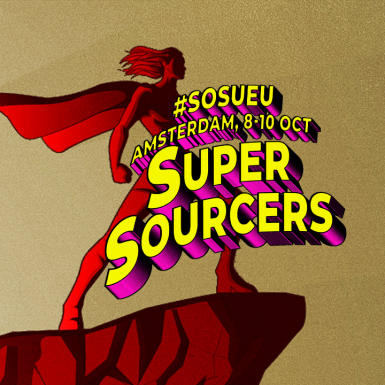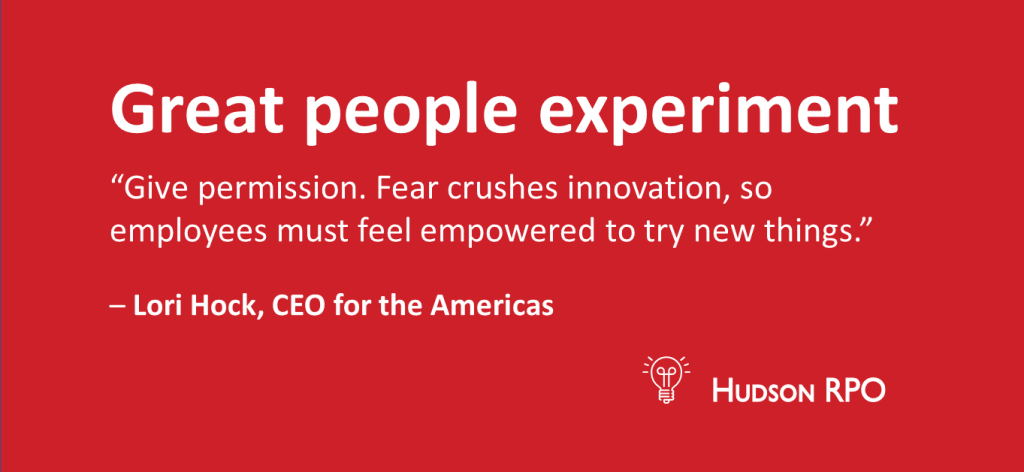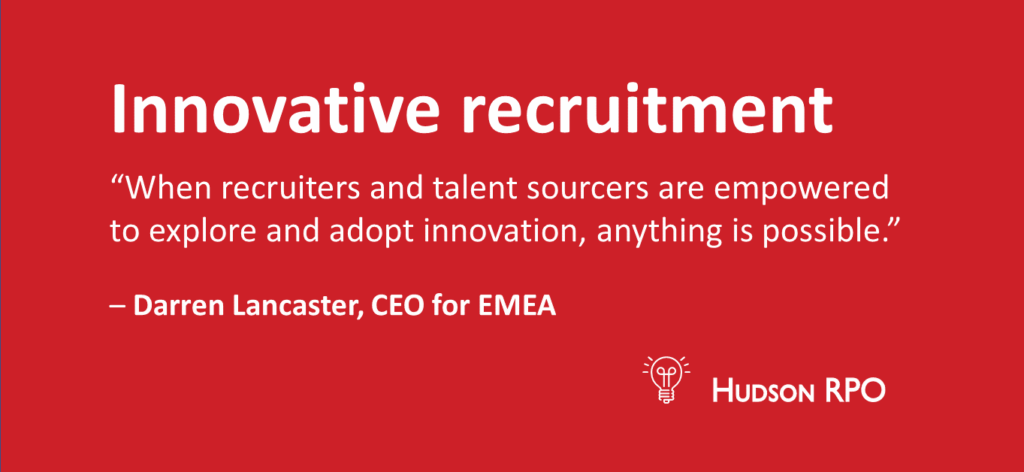- Blogs & Articles, Video
AI, recruitment, and the essential role of strategic talent sourcers
Paired with strategic talent sourcing, artificial intelligence (AI) elevates recruitment strategies. Want to know how? Watch our mini video now, or read more below.
When properly aligned, AI and human talent skills help you find stronger candidates. This combination enables you to attract niche candidates and other star talent.
But what are the key considerations for integrating AI into your talent acquisition processes? We talked with three of our global sourcing leaders about what works and what doesn’t.

Read on to discover how:
- AI elevates the role of talent sourcers
- Fairness must be entrusted to recruiters, not AI
- A human approach can offer tremendous creativity
We’ll also explore which parts of recruitment should and should not be automated, before digging into how to best leverage tech with strategic sourcing, for short-term vs. long-term hiring.
By the end, you’ll discover how to fine-tune a talent process that successfully bridges AI benefits with the extraordinarily wonderful human competencies of experienced sourcers and recruiters.
From a talent sourcing view, AI is your biggest ally
Let’s be clear: AI has not replaced talent sourcers, and it won’t be doing so any time soon.
The process of sourcing great candidates includes far too many touch points that require a meaningful human connection.
As talent leaders, we must display emotion, establish trust, share humor, and more. And, it almost goes without saying, we must exercise our uniquely human ability to convey empathy.
Typically, when you’re recruiting for specialized roles, you need technology solutions that enable high-touch (human-led) recruitment.
Conversely, when you’re dealing with high-volume recruitment, you need to consider solutions that are more technology-based, rather than recruiter-driven.
While technology can automate much of the traditional administrative work associated with finding and sorting resumes and CVs, it can also elevate the role of talent sourcer from junior contributor to strategic partner.
Think of it this way, says Cameron Davidson, Director of Strategic Sourcing for Hudson RPO in APAC:

“Where AI drops off, the strategic sourcer picks up, thanks to the talent sourcer’s ability to represent the company’s employer brand, to begin building a strong relationship and to gauge the quality level of the candidate.”
With AI tools powering different parts of the recruitment process, sourcing now depends heavily on the ability of talent specialists to drive engagement with preferred candidates.
George McRobbie, Service Delivery Director for Hudson RPO in EMEA, explains: “Talent sourcers put significant energy into candidate management and opportunity marketing to build strong talent pipelines. Great talent sourcers play a vital role as business partners to recruiters and hiring managers.”

Technology and sourcing: maintaining fairness
If you’re going to embed AI into your talent processes, then you need to consider fairness and objectivity within the design of AI.
So, can AI be biased?
Yes, just as much as any person can.
Any kind of AI can be biased, depending on the biases of the original coder or coding team.
“Tech isn’t smart enough to teach itself,” says Cameron. “Talent sourcers need to teach it by applying augmented intelligence.”
Bias does happen. It’s up to recruiters and talent sourcers to call it out.
For example, an AI tool was found to be using data patterns to eliminate female candidates from Amazon opportunities.

George explains: “In the Amazon example, the tool was responding to patterns in resumes submitted during the previous decade. Given most resumes were from men, the tool began rating female candidates lower. It was an imperfection, which required a human being to catch. As talent professionals, we need to monitor results of the tools to check whether the tools learn bias in recruitment.”
There are many tools available to help recruiters eliminate the potential for bias. One example is the gender bias decoder tool, which scans job adverts for gender-coded words. It’s a free tool, based on a research paper that appeared in the Journal of Personality and Social Psychology.
The strategic sourcer: flexible, creative, resourceful
The human touch enables a wider view of candidate potential, sometimes more than AI can offer on its own.
Upon reviewing a candidate’s potential, Tara DePeau, Recruitment Consultant for Hudson RPO client GSK, regularly considers whether they might be suited to other roles within the company.
Tara says: “If the candidate is targeting a director-level title, I’ll see if there’s an associate director role available, so the candidate might grow into the role. This approach is also better for candidates because it gives them a stronger chance of securing a role with the company.”

She explains: “Advanced sourcing is the difference between 10 solid candidates, vs. 100 candidates who are mostly not interested. This is particularly important if you need to quickly fill many specialized or senior roles. Done right, it’s like having a personalized salesperson promoting the opportunity.
“For example, I read candidates’ resumes and personalize the outreach to include a specific reference to their background. I also network with the hiring manager and their team. Does the candidate’s background share similarities with theirs? For example, did they attend the same college? If so, the college should be a good source of candidates.”
While technology allows sourcers to be more productive, the human factor enables them to be strategic.
George explains: “Sourcers are also the face of your employer brand. They’re usually the first human representative of your employer brand that a candidate engages with. The marketing department proactively pushes the brand, but the sourcer needs to represent your brand well, sharing key talking points with authenticity.”
What parts of sourcing should be automated?
AI in recruitment can’t build key relationships the way that humans can. But it can reduce time spent on administration, for example.
But even before that, or perhaps alongside, there exist other talent functions that are best served by people, or at least, by a combination of machine and human.
These tasks are often well-served, at least in part, by automation:

- Screening
- Sourcing
- Candidate assessments
But many talent professionals still recommend an element of human input into these processes.
For harder-to-fill roles, strategic sourcers will look for transferable skills, says Tara. Sourcers are well-equipped to spot potential in a more junior candidate, she adds.
Tara recommends personalized sourcing. This means personalizing communications based on relevant qualifications and other details that a recruiter has picked up on while researching the candidate.
“Whichever side of the hiring table on which you sit, people like the personalized experience,” Tara says. “This multipronged approach is a higher level of recruitment.”
Resume software is another grey area, where machine learning benefits from human oversight.
Cameron says: “AI and technology tools do provide easy access to talent. AI can leverage keywords and filter groups of candidates. However, it doesn’t fully understand the nuances of CVs. Some CVs are better written than others.”
Tara has also observed the limitations of resume software.
She says: “I agree, not all CVs are equal. Some may not have the right keywords included to be detected in automated search. For example, certain consulting roles have general analyst titles, but their resumes don’t speak to the specific industry experience.”
Leveraging AI in recruitment for different hiring needs
Of course, the point of all this is not to use technology for technology’s sake.
But, there are a multitude of administrative, repetitive steps that go into recruitment and talent sourcing. Augmented reality can help you reclaim time from these resource-diverting projects.
This approach offers short-term as well as long-term benefits. Expediting or automating low-skilled tasks enables your HR specialists to add value to other key business opportunities and initiatives.

Longer term, if the business is considering a market expansion, you should absolutely seek talent sourcer input. This is likely to include technology-assisted talent mapping.
Sourcers can research the available talent and compensation requirements. Decisions based on these insights can make or break a company’s market expansion plans.
Knowing whether key talent exists in a geography is also critical to new market success.
George says: “Particularly in a competitive market, talent sourcers advise the business on candidate expectations around salary and other career incentives. We’re often trying to tempt people out of their current jobs. Collecting and sharing candidate feedback can help inform the business strategy on how to effectively attract elusive candidates.”
He explains further: “The ideal scenario involves the recruiter serving as a project manager, taking a business partner role. In addition to looking after active vacancies, the recruiter supports the longer-term strategy. Knowledgeable recruiters can be consulted on all matters pertaining to the candidate market.

“Talent sourcers can use human- and tech-based insights to provide market intelligence to the business. This enables proactive sourcing and strategic marketing of the employer brand.”
Want to learn more about AI in recruitment?
When it comes to using technology in recruitment, best practices are often found at a local level. Moreover, data protection laws will also vary by country and region. Learn more about our recruitment technology services or contact us for more information.

Hudson RPO
Content Team
The Hudson RPO Content Team is made up of experts within the Talent Acquisition industry across the Americas, EMEA and APAC regions. They provide educational and critical business insights in the form of research reports, articles, news, videos, podcasts, and more. The team ensures high-quality content that helps all readers make talent decisions with confidence.
Sign up to receive the latest recruitment insights and Hudson RPO news.

















